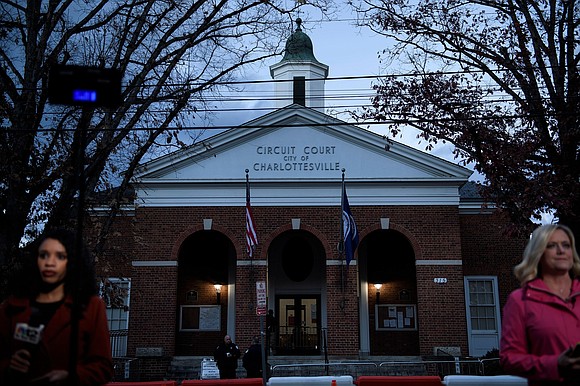Both sides agree he drove into a crowd. His intent is the issue as the Charlottesville trial opens
CNN/Stylemagazine.com Newswire | 11/29/2018, 1:36 p.m.

By Madeline Holcombe, Laura Dolan and Dakin Andone, CNN
(CNN) -- Attorneys for both the prosecution and defense agree that James Alex Fields Jr. drove his car into a crowd of counterprotesters last year at a white nationalist rally in Charlottesvile, Virginia. Heather Heyer, 32, was killed in the incident.
But in their opening statements in Fields' trial Thursday, they disagreed about why he did it.
"This case isn't about what he did," prosecuting attorney Nina-Alice Antony said in her opening statement. "It's about what his intent was when he did it."
Fields is accused of plowing his Dodge Challenger into a crowd of counterprotesters during the August 2017 Unite the Right rally, killing Heyer and injuring several others. The incident followed a period of racially charged violence in Charlottesville and sparked national outrage, putting the country on edge.
The prosecution has alleged in court documents that Fields drove the car into the crowd with the intention of hurting people he targeted based on his bigoted views.
But an attorney for Fields told prospective jurors this week that he acted in self-defense, according to CNN affiliate WVIR.
"Ms. Antony is correct. This is not a whodunit case," said defense attorney John Hill in his own opening statement. "This is not about who drove that car."
Hill described counterprotesters as acting hostile towards Fields, and claimed that his client saw one with a gun in his hands. Hill added that Fields said "he was scared to death" when he was apprehended by police.
"It is our hope at the end of the trial you'll find Fields not guilty of the charges," Hill said.
Attorneys offered their opening statements after the jury in Fields' was finalized Thursday morning. Judge Richard Moore has allotted 18 days for the trial.
Driver also faces federal hate crime charges
Fields is charged with first-degree murder in the death of Heyer, a local paralegal who attended the rally to speak out against white supremacy and racism. Her friends and family have said she died for her beliefs. Heyer's mother, Susan Bro, told CNN's Jason Carroll she would be at court every day and wanted to see all the evidence against Fields come out.
Fields also faces five counts of malicious wounding, three counts of aggravated malicious wounding and one count of failing to stop at an accident involving a death.
Separately, he is charged with hate crimes in a 30-count federal indictment. Prosecutors in that case allege Fields espoused white supremacist ideals and denounced minorities on social media before traveling to Virginia for the rally.
The 21-year-old has pleaded not guilty to the federal charges. It's unclear whether he has entered a plea to the state charges, though a trial would not likely be necessary if he had pleaded guilty.
His attorney, Denise Lunsford, did not return an email seeking comment. Fields is being held without bail in the Albemarle/Charlottesville Regional Jail.
Jury selection 'most complicated,' judge says
Attorneys completed their questioning of prospective jurors on Wednesday. A panel of 16 jurors -- including four alternates -- was seated when court resumed Thursday morning.
The jury is made up of nine women and seven men, one of whom is black. The rest of the jury is white.
Moore called it "the most complicated jury selection" he has participated in over 37 years as an attorney and six as a judge.
He acknowledged Wednesday that someone is conducting robocalls related to the case and warned prospective jurors to hang up if they receive one.
Moore previously denied Fields' defense team's request to move the trial out of Charlottesville, according to CNN affiliate WVIR. Fields' lawyers had argued that the community is too connected to Heyer's death and other violence from the Unite the Right rally to provide a pool of objective jurors.
"Despite careful (jury selection)," Fields' defense team argued in a motion, "potential jurors' resilience in their attempts to move forward may easily develop into prejudice against Fields, a prejudice that will be unlikely recognized by those affected and difficult, if not impossible, to ferret out."
The prosecution rebutted that pretrial publicity is no reason to change the venue.
The trial is expected to bring intense interest. In anticipation, Moore has established several rules and made arrangements to accommodate reporters and the public. He also has banned bags, signs and electronic devices from the courthouse.



